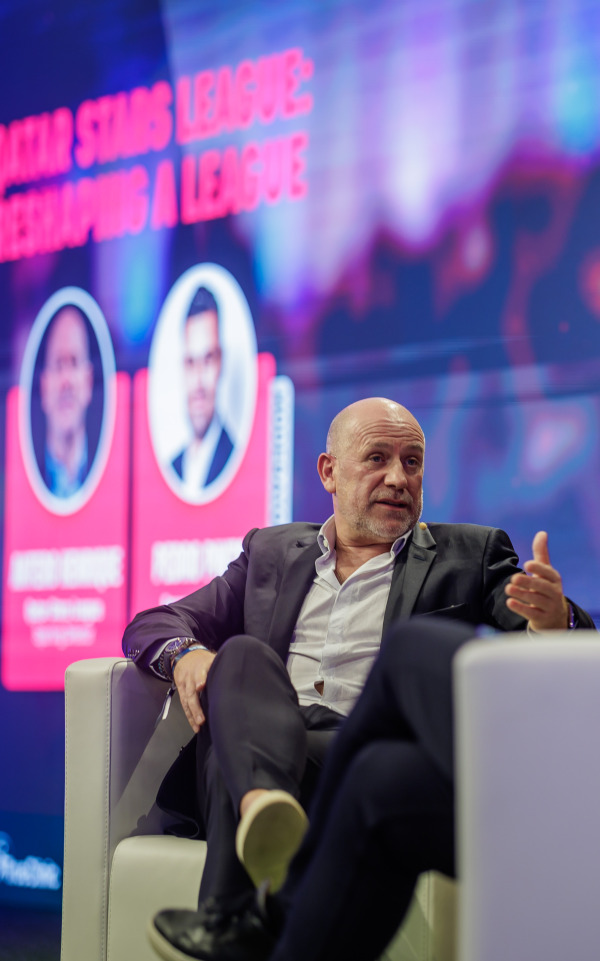Antero Henrique and the restructuring of the Qatar Stars League

Antero Henrique and the restructuring of the Qatar Stars League
The executive is a key figure in the reform of Qatar's league
Returning to the Thinking Football Summit, this time to participate in the panel "Qatar Stars League: How to Restructure a League," which took place this Saturday on the TFS Stage, Antero Henrique, former sports director of FC Porto and Paris Saint-Germain, shared his strategic vision on transforming the Qatar Stars League. "The idea behind the QSL was clearly to maintain stability over time and to build or rebuild the league with a sustainable positioning, rather than something fleeting," said the executive.
Antero Henrique emphasized the importance of football within Qatar's entertainment investment plan, stating that sports are one of the country’s major investment vectors. "We capitalized very well on the momentum of the 2022 World Cup to promote the assets we needed to attract, and it was clearly an unquestionable help," he noted, highlighting the impact of the tournament as a springboard for the QSL.
One of the most significant changes implemented in the QSL was the recruitment of young players, aiming to change the perception that Qatar was merely a destination for players at the end of their careers. "We sent a strong message to the market as soon as we began recruiting under-21 players. We signed 40 players in the initial phase, all under 21, providing them with career and process stability they don't normally have," he detailed. This focus on youth was crucial to changing the stigma that Qatar was only a "final destination market" and transforming it into a "departure market," where young talents could grow and gain visibility.
Recruiting young players not only helped change the perception of the league abroad but also contributed to developing a new generation of local coaches and players, who now view the league with more motivation and ambition. "This pool of young players helped make the coaching process more consistent and motivated young local players," he added.
Comparing the Qatar project with the Saudi one, Antero Henrique acknowledged that the objectives and strategies of the two leagues are different. While Saudi Arabia has adopted a high-profile approach by signing big names like Cristiano Ronaldo, Qatar has followed a more sustainable and consistent path. "Saudi Arabia is a different project, with huge media exposure thanks to Cristiano Ronaldo's great influence. Qatar's idea is different: consistency, sustainability, and the recruitment of credible resources," he explained.
Another crucial aspect of the QSL transformation has been the shift in mentality regarding player recruitment, with Henrique emphasizing that in Qatar, performance is a non-negotiable factor, regardless of a player's age or popularity.
In conclusion, Antero Henrique highlighted the importance of Portuguese talent on the international football scene, praising the development of players and coaches in Portugal. "Portuguese football professionals are associated with talent. Clubs train players and coaches very well," he emphasized, noting the positive impact the Portuguese have had both in Qatar and other international markets.
News
Historic: Women's football clubs surpass €100 Million in revenue
For the first time ever, the combined revenue of top women’s football clubs in key markets has exceeded ...
How to succeed in the Sports Industry? Four tips from Rafael Nadal
Rafael Nadal is renowned for his excellence, determination, and relentless pursuit of victory. With 22 Grand Slam ...
Al-Nassr signs Esports player for record-breaking fee
João Afonso, world champion in FIFA and EA Sports FC, known as "Jafonso," has made history with the most ...
Is Netflix prepared to stream major sporting events? Insights from the Jake Paul vs. Mike Tyson fight
The live broadcast of the Jake Paul vs. Mike Tyson boxing match on Netflix marked a significant step for the platform, ...
European Leagues and FIFPro vs. FIFA: Lawyer Gonçalo Almeida explains the complaint to the European Commission
The European Leagues, chaired by Pedro Proença, along with FIFPro, has filed a complaint with the European ...
